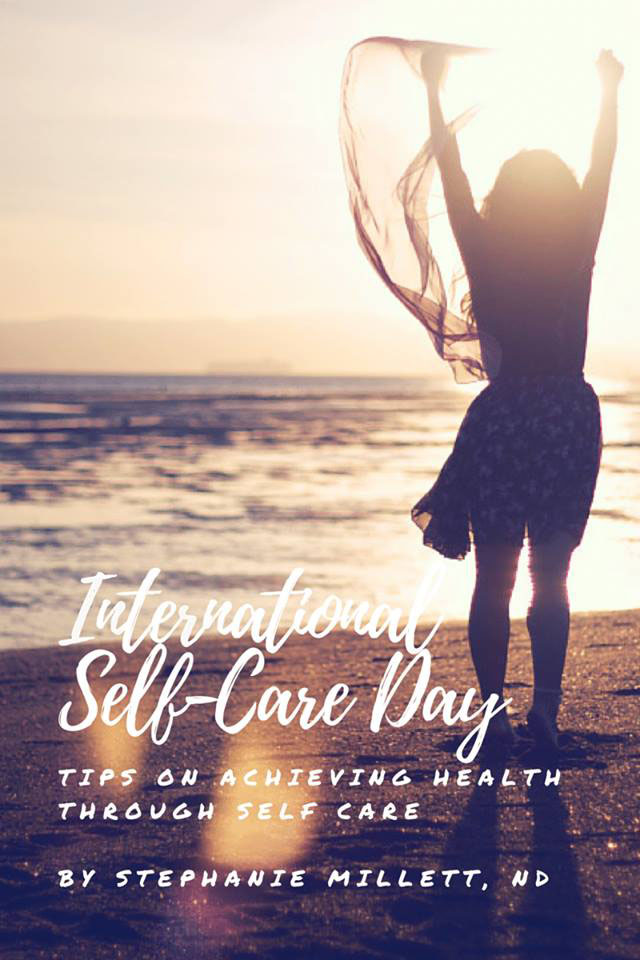
International Self-Care Day 2016
Happy International Self-Care Day!
As caregivers to the young and old, relationship partners, employers and employees, many of us spend a huge proportion of our time and energy serving others. While I recognize the importance of thoughtfulness and attentiveness in building and maintaining both personal and professional relationships, I wonder what our lives would be like if we all spent an equal amount of time taking care of our own needs.
So, what is self care? Let me start me telling you what it’s not. It’s not about caring more about ourselves than others. I liken it to the oxygen-safety spiel that any of us who have ever flown commercial have heard over and over. You know the one– before placing the oxygen mask on anyone else make sure yours is secured first. While this is crucial for ensuring survival in an emergency situation on an airplane, the concept is just as important in our everyday lives. In order to be able to care for, provide for and help others, we must FIRST care for, provide for and help ourselves.
The term self care encompasses any intentional actions taken to care for your physical, mental, emotional or spiritual health. We’re talking both basic needs that are similar for everyone like hydration, nutrition and oxygen, as well as those activities that nurture your soul! Developing a self care plan is an individualized task as we are all so wonderfully unique, but here are some more general ideas to help get you started on taking care of YOU.
- NOURISH your body and mind with nutrient dense whole foods: This means making time to prepare and eat healthy foods (fruits and veggies, whole grains, beans/legumes, lean protein, healthy fats) no matter how busy our days may be. Try making a meal plan and prepping your food on the weekend for ease and efficiency.
- Exercise and movement: 30 minutes of exercise 5 days/week is recommended by the CDC to reduce the risk of cardiovascular disease, certain cancers, depression, metabolic syndrome and stroke which are all associated with sedentary lifestyles. Research is also showing that despite how physically “fit” we are, number of hours we spend sitting is still strongly correlated with incidence of certain diseases. The good news is that studies are also showing that standing up every 20 minutes for only 2 minutes seems to decrease this risk! So try setting a timer, downloading an app (yup–there’s an app for that) or teaming up with a co-worker to remind yourself to stand up for your health.
- Water: The average adult should be consuming 2-3L of water every day. Water is crucial for our bodies to carry out normal function. Dehydration can lead to lack of energy, headaches, digestive complaints and many other symptoms. So fill up that glass or stainless steel water bottle and make water your new best friend.
- Sleep: I can’t begin to tell you how important sleep is…but I’ll try. During sleep your body and mind finally have the time to rest and regenerate tissue and chemicals that have been used during the day. The average adult requires 8 hours of quality sleep every night in order to provide enough energy to the brain and body for the next day. Sleep hygiene is a whole other topic that I will discuss in future posts, but for now try building night time routines that don’t involve screen time (T.V., computers, phones, etc.) in order to improve sleep quality.
- Soak up the sun: It’s summertime and we finally have ample opportunity to catch some rays along with our daily dose of vitamin D! A safe amount of sun exposure can support healthy mood, immune function, skin health and much more. For more information on sunscreen safety, I would recommend checking out the environmental working group’s 2016 guide to sunscreen to find a product that is effective and safe for you and our environment. (www.ewg.org)
- Meditation or relaxation exercises: Stress can impact our health in many ways. It can burden our mental health as well as our physical health and leave us feeling overwhelmed if we don’t have strategies in place to help manage day to day stressors. Meditation and relaxation exercises are one of many techniques to help people cope with stress. You don’t have to be a master in the art of meditation to benefit from the practice and there are numerous programs and apps to guide you through meditation if you are a beginner. Some of my favorite apps include buddhify, headspace andcalm.com. Research has identified actual changes to neurological patterns in response to stress in individuals who practice meditation. How incredible (and empowering) is that?!
- Vacation: I will always remember my botanical medicine professor at college talking about his recommendations to patients to take a vacation by the seaside. This resonated with me greatly as I was, at the time, an East Coast girl living in Toronto and missing the ocean terribly. Not only have I personally experienced the therapeutic effects of vacationing by the seaside but a great number of patients report to me that their symptoms are alleviated while on holiday. Whether this is due to stress reduction, improved sleep, increased physical activity or a combination of many things, I am not sure. What I am sure of is that you can find me at the beach during my down time and I hope to see you there!
By Dr. Stephanie Millett, B.Sc., ND.
To explore more of what YOUR individual self-care plan may comprise, call the Legge Health Clinic at 902-843-7475 or visit our contact page to book your naturopathic appointment.
Legge Health
Share this Post
